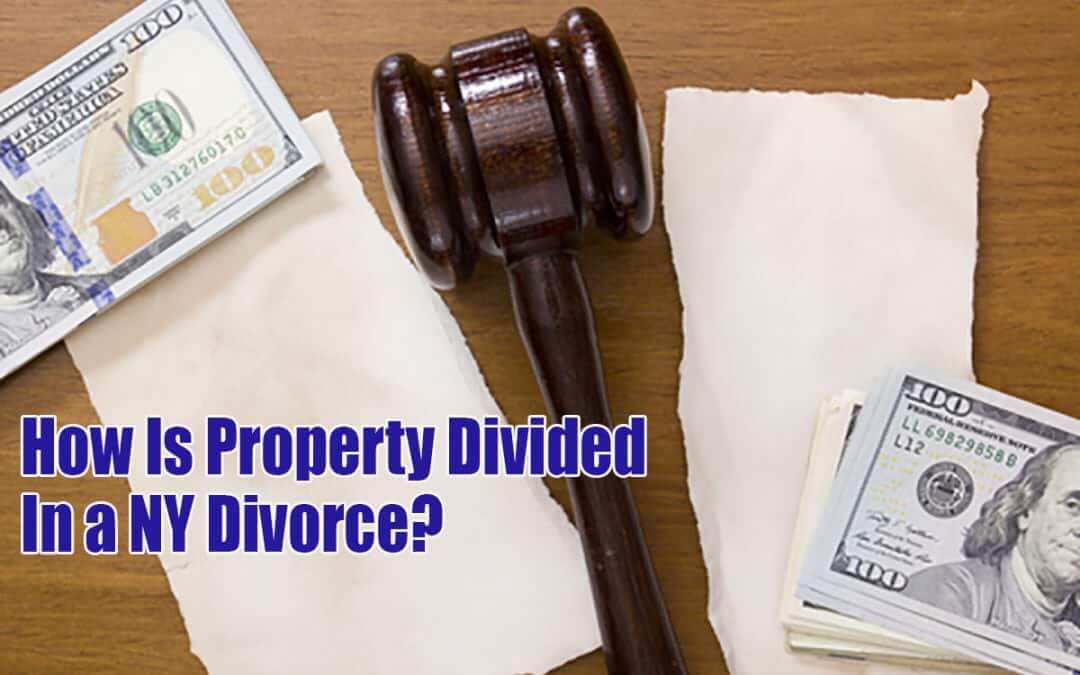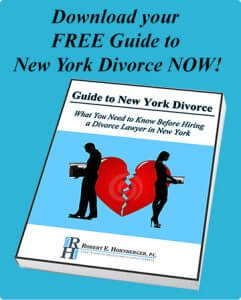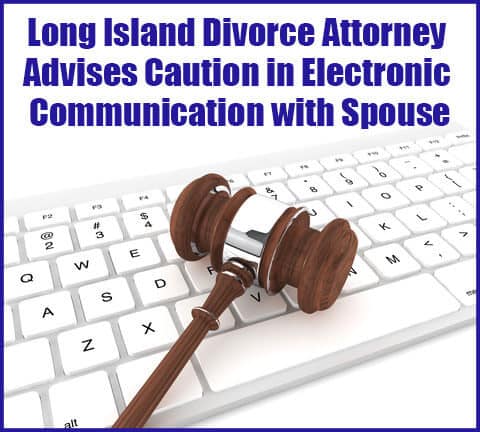


Divorce Mediator Long Island Explains the Benefits of Divorce Mediation over Divorce Litigation
As a Long Island divorce mediator and divorce attorney, I always look for the best solution to legally resolve my clients marital status. By “best”, I mean the one that will allow them to move forward with their lives as individuals with the least stress, least economic impact (least expensive) and in the least amount of time (which translates to less cost and stress as well). In cases where the spouses are able to communicate effectively and negotiate the terms of their divorce, this is often divorce mediation as opposed to divorce litigation.
If you are considering a divorce, or in the middle of a divorce in New York, you may be wondering about divorce mediation and whether there are any benefits of mediation over an adversarial divorce proceeding. A divorce attorney in Nassau County or Suffolk County may be able to help you get through your divorce with more confidence and less stress and less expense by utilizing divorce mediation rather than divorce litigation in a courtroom in Nassau County of Suffolk County.
The end of a marriage can be an unimaginably stressful time and can rock the worlds of the spouses and children involved. The process of divorce raises questions about division of property and rights that the couple never imagined as potential issues. Divorce litigation can become a battle of the wills. It is not uncommon that two people who once loved each other can become bitter and threatening, resulting in an extended tug of war that lasts longer than their courtship before marriage.
Divorce mediation on Long Island is an excellent method of reducing the time, cost, and stress involved in a Nassau County or Suffolk County divorce. The differences between mediation and litigation can be tremendous. Divorce mediation allows both spouses to come before a neutral, skilled divorce mediator whose goal is to address questions, concerns and assist the parties in coming to an agreement. The divorce mediator will help the both spouses learn to identify, address and successfully resolve the legal matters which are presented by their divorce in a non-confrontational or threatening way. Issues such as child custody and care, division of assets, financial support and many others are often best resolved in a cooperative, goal oriented atmosphere rather than by an adversarial fight. Furthermore, because a divorce mediator does not represent either spouse, he or she has all the tools to help couples facing a divorce in Nassau County or Suffolk County come to a mutual agreement while saving time and money.
Divorce mediation can be a far less stressful process than divorce litigation. In a neutral setting, the parties can work out the details of the divorce agreement and maintain some control over the outcome, rather than having two opposing divorce attorneys battle it out in court. Parties are often surprised how many details can be worked out in a mutually agreeable fashion in divorce mediation.
Of course, divorce is never pleasant, and mediation cannot take the emotional pain away. However, mediation can greatly reduce the amount of stress placed upon the family by offering a supportive and cooperative forum for problem solving. Parties are assisted in maintaining a smart, practical state of mind in the decision-making and compromise process, rather than allowing resentment and other emotions get the best of them. The goal of mediation is to come to an agreement by which both parties can successfully move forward with their lives after this life-changing event. Children of the couple are also great beneficiaries of this method of divorce as their parents are not at each other’s throats during the divorce, which leads to better communication regarding child-rearing after the divorce.
For example, the care and custody of the children can be especially difficult for parties to agree upon. Common sense may indicate that the best interests of the children would be found in reaching a mutually agreeable plan, but parents are often unwilling to budge in this area. A Divorce Mediator in Nassau County or Suffolk County may be able to reframe the issue within the framework of smart parenting and the children’s best interests, and shift the focus away from divorce adversaries who each want to “win.” In fact, if the parents go through divorce litigation, the outcome will be completely unpredictable, and a judge will tell them when and for how long they can see their children. If parties are able to use reason and compromise as tools to support the post-divorce family, they will have far more control over the outcome. Usually, this results in a more peaceful and balanced set of circumstances for the parents, children and extended family after the divorce is finalized.
On the contrary, contested divorce litigation places the decision making in the hands of a Nassau County of Suffolk County court. The parties each present their case through a trusted attorney, and then must surrender control to the hands of the judge to determine what is best for their family. An adversarial divorce proceeding usually results in increased costs, litigation, a lengthier process, loss of privacy in some sensitive matters, and can have unpredictable results, all in addition to the pain of a broken marriage.
There are no winners in divorce litigation. Even if one party receives greater financial or child custody results in court, that party still must face the post-divorce family dynamic, especially if there are children involved. Divorcees often realize that, after all is said and done, the family would have better been served by care and consideration for each family member, including the ex-spouse. Learning to engage in divorce mediation in the context of divorce can set the tone for future family interactions that may be inevitable throughout the parties’ lifetimes. Even if you feel there is only a slight possibility that litigation can be avoided in your particular divorce circumstances, mediation is certainly worth a try.
Receive a Free Consultation from an Experienced Long Island Divorce Mediator or Divorce Attorney in Nassau County, Suffolk County, Long Island, NY
To learn more about Divorce Mediators on Long Island and how they can save you time, money and stress, visit this page: Divorce Mediator Long Island | Nassau County & Suffolk County. A Long Island divorce mediator who is also a divorce attorney can best help you decide if divorce mediation or divorce litigation is the best route to end your marriage while protecting your and your family’s rights and interests. Reach out to the Law Offices of Robert E. Hornberger, Esq. at 631-923-1910 for a free confidential consultation, or fill out the form on this page and we’ll get right back to you.
Download our Free New York Divorce Guide
 Our 41-page “Guide to New York Divorce: What You Need to Know Before Hiring a Divorce Lawyer in New York” written by an experienced divorce lawyer Long Island’s Robert E. Hornberger, Esq., provides you with real information on the divorce process and the laws it rests upon in the state of New York. This book will help give you a solid foundation upon which you can begin the process of making your family’s, life better. Download your Free Guide to New York Divorce here.
Our 41-page “Guide to New York Divorce: What You Need to Know Before Hiring a Divorce Lawyer in New York” written by an experienced divorce lawyer Long Island’s Robert E. Hornberger, Esq., provides you with real information on the divorce process and the laws it rests upon in the state of New York. This book will help give you a solid foundation upon which you can begin the process of making your family’s, life better. Download your Free Guide to New York Divorce here.

Divorce Attorney Long Island Advises Caution in E-Messaging Your Spouse
A Child’s Punishment for Adults Who Act like Children in Long Island Child Custody Cases in Nassau & Suffolk
According to one New York judge, those obnoxious emails and text messages you send to your spouse could wind up doing more than just angering your spouse or embarrassing you one day. They could land you in jail.
The April 20, 2015 Supreme Court matter of L.T. v. K.T. focused on, amongst other things, the Defendant father’s continuous and routine harassing and threatening emails and text messages to the Plaintiff mother. The judge, although aware that this behavior is, unfortunately, not uncommon in matrimonial matters, took a stand against this type of ridicule and ordered the Defendant father to spend fifteen (15) days in jail. The equivalent of sending a child to his room after he misbehaved.
The Child Custody & Visitation Case of L.T. v. K.T.
The parties’ matrimonial matter began like most do, with motion practice attempting to resolve the issues of child custody and visitation. In an effort to resolve the issues without extensive court appearances, the parties and their attorneys placed two (2) stipulations on the record in open court – one pertaining to child custody and visitation and the other pertaining to financial matters. The Plaintiff mother eventually found herself in a situation that required her to file a motion seeking to have the Defendant father held in contempt of Court, because, amongst other things, he failed to limit his communication with her to one (1) e-mail per day for the sole purpose of discussing the children.
The Plaintiff mother provided documentary evidence to the court, consisting of numerous e-mails and text messages she received from the Defendant father. These communications had nothing to do with the parties’ children, and were merely the Defendant father unleashing his anger on the Plaintiff mother. Included in these communications were the Defendant father stating the Plaintiff mother was “the stupidest person [he] ever encountered”, telling the Plaintiff mother “f*ck you”, stating that he was “the competent parent…as always” and that the Plaintiff mother should remember the phrase “welcome to McDonald’s can I take your order.”
When brought to the attention of the Court, the Defendant father attempted to justify his actions by saying the Plaintiff mother was condescending, and his were simply responses in an attempt to stop her from being a bully. This did not faze the Court. The Court sentenced the Defendant father to serve fifteen (15) days in jail.
Applying this Ruling to your Nassau County or Suffolk County, Long Island Divorce Proceeding
Although the Court’s determination to sentence the Defendant father to jail time was not solely based upon his crude text messages and emails, the language used to support this determination shows that the Supreme Court does not take childish e-mails and behavior by parents lightly. The Court focused on the fact that the parties had joint custody of the unemancipated children who were the subject of the proceeding. Joint custody requires the parents to co-parent and work together as a team. If one parent cannot say anything to the other without cursing or belittling the other parent, it is unlikely a joint custody arrangement is proper.
How should the parents resolve this? The Court stated “Get over it. If the parties want their joint custody to work, they must make it work.” In my legal opinion, the Court made its views on childish behavior by parents more than clear with that one simple sentence.
As an experienced Long Island Divorce Attorney I understand that emotions run high during and after divorce proceedings. However, I always advise my clients to try their best to keep their emotions, especially anger toward their spouse, at bay, and this ruling justifies my advice. The worst thing a client can do is send a nasty e-mail or text message to their spouse. As with everything these days, once you transmit this correspondence you cannot get it back. Instead, I urge clients who are struggling with anger to write things down in a journal or other private place or discuss them with a trusted friend or family member. I find that the majority of times it is not that my client wants to say these things to his or her spouse, but that he or she simply wants to vent and get it off of their chest.
Get a Free Consultation from an Experienced Divorce Attorney Practicing in Nassau County & Suffolk County, Long Island
For more information about how to protect yourself and your children during your divorce in Nassau County of Suffolk County, contact a Long Island divorce attorney with great experience in all divorce and family law matters. Long Island’s Robert E. Hornberger, Esq., PC and his compassionate and experienced divorce lawyers can help. Call us at 631-923-1910 for a complimentary, confidential consultation or fill out the short form on this page and we’ll get right back to you.
Download our Free New York Divorce Guide
 Our 41-page “Guide to New York Divorce: What You Need to Know Before Hiring a Divorce Lawyer in New York” written by an experienced divorce lawyer Long Island’s Robert E. Hornberger, Esq., provides you with real information on the divorce process and the laws it rests upon in the state of New York. This book will help give you a solid foundation upon which you can begin the process of making your family’s, life better. Download your Free Guide to New York Divorce here.
Our 41-page “Guide to New York Divorce: What You Need to Know Before Hiring a Divorce Lawyer in New York” written by an experienced divorce lawyer Long Island’s Robert E. Hornberger, Esq., provides you with real information on the divorce process and the laws it rests upon in the state of New York. This book will help give you a solid foundation upon which you can begin the process of making your family’s, life better. Download your Free Guide to New York Divorce here.

Divorce Attorney Long Island Offers Tips to Save Your Marriage
Divorce should be a last resort
You owe it to yourself, your spouse & your children to try to save your marriage before seeking a divorce in Nassau County or Suffolk County
As a Divorce Attorney on Long Island I meet with countless individuals considering their options about divorce who are not yet ready to take that step. They are in my office because they feel their marriage is falling apart and they want to know what will happen in the event of a divorce. I am more than happy to answer their questions, however, I immediately ask, “Have you told your spouse how you feel?” Some say yes and some say no.
Now, I am no marriage counselor, however, I view my role as an advocate and advisor. It is not my place to convince anyone that they need to seek a divorce. That decision belongs to the individuals involved, not me. So, when I am faced with this scenario, here is some of the armchair advice that I give:
1. Marriage Counseling: Most marriages have their ups and downs. Honestly, I see a lot of couples throwing in the towel without even considering counseling. It is always worth considering, especially if there are children involved. So long as there is no domestic violence involved, I think the couple owes it to themselves and their children to give counseling a chance before seeking a divorce. I have worked with many couples who started a divorce proceeding, and at some point decided to give counseling a chance, and because of counseling, saved their marriages. I have even received cards from those individuals thanking me for not pushing a divorce and supporting their decision to try to work it out. I am not saying that counseling is the magic pill that will save every marriage; however, if haven’t tried, how will you know? So, before ending your marriage, make sure you have no regrets.
2. Romantic Gestures: A client recently told me that her spouse was unhappy because he didn’t feel loved. She told me, “He has some nerve. When was the last time he told me that I was pretty. I can’t remember the last time he took me on a date.” I immediately thought to myself, marriage is a two-way street; you each have to put in the effort. I recently saw a post on social media that marriage isn’t 50-50, it’s each spouse giving 100 percent of themselves to their spouse. All too often I see that couples get comfortable with each other and take their spouse for granted. So, if your marriage is going through a rocky period, try to spice things up. Plan a date. Don’t tell your spouse the itinerary, keep him or her guessing. Go away for a night, a weekend, a week. Go out to dinner at a new restaurant. Do anything that isn’t your normal routine. Buy her flowers. Get him a new tie, shirt, etc. But stop complaining that your spouse doesn’t treat you the way that he or she used to if you’re not putting in the effort either.
3. A Trial Separation: OK, you went to counseling. You did the romantic thing. Your marriage still seems to be falling apart. Before committing to something as final as a divorce, you can give separation a try. I don’t mean a legal separation, I mean a physical separation. Try staying apart for some time. The couple can sign a letter agreement wherein they acknowledge that they are giving physical separation a try and that no one is abandoning the other and that neither party is giving up any legal rights to property or the children. The couple should also include who will pay what bills during this time in the letter. Some time apart may clarify the relationship for the couple. Maybe you will miss your spouse. Maybe you won’t. Maybe you will realize you can’t live without him or her. Or, you may realize you are better off apart. Either way, you will know that you pursued every avenue to see if your marriage will work before throwing in the towel.
So, if you are considering a divorce, ask yourself “have I done everything I can to work on my marriage?”. Maybe your marriage can’t be saved, or, isn’t worth saving; that decision lies with you. However, if you are meeting with a divorce lawyer to get information about divorce just in case, maybe your time is better spent coming up with a plan to save your marriage.
Receive a Free Consultation from an Experienced Divorce Attorney Practicing in Nassau County, Suffolk County, Long Island
As a Divorce Attorney on Long Island, I never mind meeting with anyone who is seeking legal information about a divorce. Therefore, if you would like a free, confidential divorce consultation with an experienced Long Island divorce attorney, please call today. Our telephone number is 631-923-1910 or fill out the short form on this page and we’ll get right back to you. I look forward to meeting with you.
Download our Free New York Divorce Guide
 Our 41-page “Guide to New York Divorce: What You Need to Know Before Hiring a Divorce Lawyer in New York” written by an experienced divorce lawyer Long Island’s Robert E. Hornberger, Esq., provides you with real information on the divorce process and the laws it rests upon in the state of New York. This book will help give you a solid foundation upon which you can begin the process of making your family’s, life better. Download your Free Guide to New York Divorce here.
Our 41-page “Guide to New York Divorce: What You Need to Know Before Hiring a Divorce Lawyer in New York” written by an experienced divorce lawyer Long Island’s Robert E. Hornberger, Esq., provides you with real information on the divorce process and the laws it rests upon in the state of New York. This book will help give you a solid foundation upon which you can begin the process of making your family’s, life better. Download your Free Guide to New York Divorce here.

Long Island Divorce Attorney Shares Truths You May Not Want to Hear About Divorce on Long Island
The relationship between a Nassau County or Suffolk County, Long Island divorce attorney and his or her clients is a delicate thing. Clients often seek divorce attorneys when they are at one of the lowest points in their lives, their emotions are running high and their pain often outsmarts their rational thinking. To put it more simply – matrimonial and family law attorneys often come into contact with good people at their worst.
While it is a Long Island divorce attorney’s job to see things from their client’s perspective, clients rarely, if ever, put themselves in their attorney’s shoes. As an experienced divorce attorney practicing on Long Island, I pride myself on always being honest and upfront with my clients, even if that honesty requires me to tell them something they do not want to hear.
For most people, this entire article will consist of things they may not want to hear, but these things will make the relationship between them and their Divorce Attorney that much stronger.
1. You are not your attorney’s only client. Although most divorce attorneys practicing on Long Island wish they could give each client their undivided attention every second of every day, it simply is not practical. In my office, matters are handled in the following order: time sensitive matters such as court filings, motions and paperwork which needs to make a deadline; matters for a client with whom I have a meeting; and then first in, first out. At times, this will upset clients, however, just as anyone would do at their own jobs, if your attorney needs to make a deadline, that matter must come before everything else.
2. You call too often. Long Island divorce attorneys, like all attorneys, bill for their time. The more of their time you take up, the higher your bill will be. Hours spent on the phone with a client who is venting will drive up their bill because you are utilizing the attorney’s time. Your divorce attorney will listen to you for as long as you need, but you should try to keep those calls as short and to the point as possible. Always understand that you are being billed for each minute spent on the phone. As stated above, a divorce is an emotional issue. Everyone needs to vent and discuss issues out loud during their divorce. You should save these venting sessions with a trusted friend, family member or therapist; not your divorce attorney. Save your calls to your divorce attorney for legal matters.
Some clients feel the need to check in, either every few days or once a week. Your Nassau County or Suffolk County divorce attorney will always contact you when there is a development in your case or he or she needs something from you. Every matter has periods where nothing happens; this does not mean your attorney “dropped the ball” or forgot about you, it is just the way the practice of law works.
3. Your refusal to listen to their legal advice is frustrating. You hired your divorce attorney to do their job according to the law in Suffolk County or Nassau County, so your best course of action is to let them. Every now and then I will have a client who is unhappy because he or she feels nothing is being accomplished on their matter; however, the client fails to realize that he or she rejected each and every available option set forth. If you tie your attorney’s hands behind his or her back, you cannot blame your attorney for nothing getting done. Your divorce attorney wants to help you; you just have to let them use their knowledge and experience to help you.
4. Your attorney cannot work for free. Most divorce attorneys practicing on Long Island are sensitive to the fact that money is tight for a client going through a divorce; however, your attorney cannot work for free. Just like you, your Nassau County or Suffolk County divorce attorney has a family to support and a home to maintain. And just like you, they need to earn money to do so. You do not work for free, your doctor does not work for free and neither does your Long Island Divorce Attorney. Financial issues can be solved by a conversation between you and your attorney. Most attorneys, including myself, will accept a monthly payment plan to help ease the burden of a divorce.
While many people may find this article blunt, at times the truth is the hardest thing to hear. Your Long Island Divorce Attorney cares about you, but you need to have the confidence in them to trust they are doing what is in your best interests.
Receive a Free Consultation from an Experienced Divorce Attorney Practicing in Nassau County, Suffolk County, Long Island
For more information about how to protect yourself and your children during your divorce in Nassau County of Suffolk County, contact a Long Island divorce attorney with great experience in all divorce and family law matters. Long Island’s Robert E. Hornberger, Esq., PC and his compassionate and experienced divorce lawyers can help. Call us at 631-923-1910 for a complimentary, confidential consultation or fill out the short form on this page and we’ll get right back to you.
For more information about Divorce on Long Island, visit this page: Divorce Lawyers Answer Questions about Long Island Divorce
Download our Free New York Divorce Guide
 Our 41-page “Guide to New York Divorce: What You Need to Know Before Hiring a Divorce Lawyer in New York” written by an experienced divorce lawyer Long Island’s Robert E. Hornberger, Esq., provides you with real information on the divorce process and the laws it rests upon in the state of New York. This book will help give you a solid foundation upon which you can begin the process of making your family’s, life better. Download your Free Guide to New York Divorce here.
Our 41-page “Guide to New York Divorce: What You Need to Know Before Hiring a Divorce Lawyer in New York” written by an experienced divorce lawyer Long Island’s Robert E. Hornberger, Esq., provides you with real information on the divorce process and the laws it rests upon in the state of New York. This book will help give you a solid foundation upon which you can begin the process of making your family’s, life better. Download your Free Guide to New York Divorce here.
Christine M. Verbitsky, Esq. – Divorce Lawyer
HOME ABOUT US OUR FIRM FIRM YOUR LEGAL TEAM ATTORNEYS YOUR ATTORNEYS ROBERT E HORNBERGER CHRISTINE M VERBITSKY ANNEMARIE LANNI LAWRENCE M. MARINO BRENDA LYNCH (Of Counsel) PRACTICE AREAS AREAS OF EXPERTISE What’s Involved In Divorce DIVORCE DIVORCE COLLABORATIVE...Can I Change the Locks During My Long Island Divorce to Keep My Spouse Out?
HOME ABOUT US OUR FIRM FIRM YOUR LEGAL TEAM ATTORNEYS YOUR ATTORNEYS ROBERT E HORNBERGER CHRISTINE M VERBITSKY ANNEMARIE LANNI LAWRENCE M. MARINO BRENDA LYNCH (Of Counsel) PRACTICE AREAS AREAS OF EXPERTISE What’s Involved In Divorce DIVORCE DIVORCE COLLABORATIVE...Can You Get a $399 (or $450) Divorce on Long Island NY?
 As a Long Island Divorce Attorney with nearly 15 years of legal experience, there is nothing more frustrating for me than driving down a road and seeing a sign which says “$399 Divorce. Spouse’s Signature Not Required.” Or, more recently, “Uncontested Divorce as low as $450”. Sadly, this is absolute nonsense, misleading many Long Islanders into contacting firms that cannot perform as advertised.
As a Long Island Divorce Attorney with nearly 15 years of legal experience, there is nothing more frustrating for me than driving down a road and seeing a sign which says “$399 Divorce. Spouse’s Signature Not Required.” Or, more recently, “Uncontested Divorce as low as $450”. Sadly, this is absolute nonsense, misleading many Long Islanders into contacting firms that cannot perform as advertised.
A Spouse’s Signature is Required to Obtain an Action for Divorce on Long Island
Why do I say this? The answer is simple; in an Action for Divorce in any New York court, your spouse must receive personal notice of the divorce action. That means that your spouse must be personally served with the Summons for divorce. In plain English, a process server must personally hand your spouse the divorce summons (along with copies of certain required notices known as the “Automatic Orders”). In lieu of personal service, your spouse can accept service and sign an admission. In any case, your Spouse’s Signature is still Required.
Upon receiving personal service of the summons, your spouse has two (2) options:
- Ignore Service of Summons. They can ignore the fact they were served, in which case, they will be in Default. If this happens, then yes, your divorce will be obtained without your spouse’s signature, however, if you have children, you will still have to appear in court for a hearing called an Inquest to determine custody, visitation and support of your children. I have handled over a thousand (1,000) divorce cases and have only seen a default occur a handful of times, not great odds for the “Spouse’s Signature Not Required” representation.
- Appear & Defend Divorce Action. Your spouse can appear and defend the divorce action (which is far more likely than a Default), in which case, their signature for an uncontested divorce will certainly be required.
Court and Other Fees Add Up to More Than $399
Advertising a Long Island Divorce for $399 is also misleading because the minimum filing fees for a divorce alone are $335 which does not include the fee for a settlement agreement ($35) as well as the fee for the process server (usually $50.00 to $150.00), nor does it include the fee for a certified copy of your divorce ($5.00 so long as your judgment does not exceed 4 pages). Therefore, the filing fees alone can be no less than $390.00 (that’s $335.00 minimum plus $50.00 minimum for the process server plus $5.00 for the certified copy).
$399 Doesn’t Get You a Long Island Divorce Lawyer
What the “$399.00 Divorce” folks don’t tell you is that the forms are prepared by non-lawyers, and then, you are responsible for everything else. That means you have to purchase your own index number, have your spouse served, hope they Default, and then, you have to file your own papers with the Court and pay your own filing fees. You have to make your own copies and obtain your own Certified Copy of the Divorce Judgment. This means that you will appear in court yourself no less than three (3) times, which will likely require you to take days off from work.
What Does Your ‘$399.00 Divorce’ Get You?
Well, it gets you a pile of forms you can prepare for yourself by visiting the New York State Court website with instructions on how to complete your own divorce (also available on the website). No legal advice and no one to help you navigate the complex waters of divorce in Nassau County or Suffolk County. Of course, if your spouse appears in the action, which is far more likely than a Default, you will have to go to court. At that point, you should hire an attorney to represent you, since your spouse will likely have one.
Do You Know the Rules of Divorce in a Long Island Courtroom?
A divorce is a civil action like any other. There are rules and procedures and there is a lot at stake when it comes to your assets, your children, support and your future. As a Long Island Divorce Attorney, I can tell you with absolute confidence that there is virtually no such thing as a “$399.00 Divorce”. You should seek the advice of a professional qualified divorce attorney to assist you with properly preparing your pleadings, having your spouse served and navigating the Long Island Divorce Courts.
Free Consultation from an Experienced, Compassionate Long Island Divorce Attorney
What’s Better than 399? — Free!
To learn more about what you need to know about How Much a Divorce Costs and how to get help to protect yourself and your future, visit this page: https://divorce-longisland.com/divorce-cost/ Rather than get taken by the claims of a “$399 Divorce”, you owe it to yourself, your children and your future to speak with an experienced Long Island divorce attorney who can protect your interests. The initial consultation is free, so there’s no risk and no obligation. Just call us at 631-923-1910 to set up an appointment for a free divorce consultation. Your initial consultation will be a casual, no-cost meeting where we get to know each other. You will meet directly with Robert E. Hornberger, Esq., not a paralegal or junior associate. During our meeting, we’ll describe the divorce process and learn about the details of your unique situation. Then we can discuss the many divorce options available to you, from a litigated, contested divorce, to a mediated or collaborative no-fault divorce. Together, we’ll determine which is the right solution for you and your unique circumstances. Give us a call today. You’ll be glad you did.
What’s the Difference Between Legal Separation & Divorce on Long Island, NY?
No-Fault Divorce Reduces Legal Separation Agreements on Long Island But They Still Play Important Role for Many
 In 2010, New York enacted a No-Fault Divorce statute that enables couples on Long Island to be granted a legal divorce without asserting fault on behalf of either party. Prior to this, couples had generally entered into what was known as a Legal Separation Agreement, prior to getting legally divorced. The Legal Separation Agreement allowed a couple a “trial period,” apart, before commencing official divorce proceedings without fault. Now that the legal separation agreement is no longer necessary to ensure a couple can achieve a no-fault divorce, many couples have opted to skip this step and begin official divorce proceedings right away.
In 2010, New York enacted a No-Fault Divorce statute that enables couples on Long Island to be granted a legal divorce without asserting fault on behalf of either party. Prior to this, couples had generally entered into what was known as a Legal Separation Agreement, prior to getting legally divorced. The Legal Separation Agreement allowed a couple a “trial period,” apart, before commencing official divorce proceedings without fault. Now that the legal separation agreement is no longer necessary to ensure a couple can achieve a no-fault divorce, many couples have opted to skip this step and begin official divorce proceedings right away.
Don’t Rush To Divorce on Long Island
Divorce is obviously a big step for any married couple. Most people seriously consider the possibility for a long time and do not take any steps toward divorce lightly. However, when at least one of the partners finally concludes that divorce is the only solution they are naturally inclined to proceed and achieve their divorced status as soon as possible. to promptly seek a divorce. While this is understandable, divorce is the finalized, conclusive end of the marriage, and there are some significant benefits to seeking a legal separation first that should be discussed with your divorce attorney before you proceed.
What is a Legal Separation Agreement?
A Legal Separation on Long Island is significantly less formal than an official divorce proceeding. There is usually little or no involvement of the Nassau County or Suffolk County Court system in a Legal Separation on Long Island. Instead, you and your partner enter into a contract with the help of your divorce attorney (keep in mind, that for the legal separation agreement to be binding, it must be filed with the court, but the court plays no role in its creation).
Legal Separation Agreements Determine Child Custody, Support, Expenses
Under the terms of this contract, which is a legally binding agreement, you and your spouse will likely agree to maintain separate residences, decide issues of child custody and support, and settle the responsibility of bills and other monthly expenses. Once both you and your partner sign the agreement, and it is notarized, the legal separation is official.
Legal Separation Does Not Always Lead to Divorce
However, just because you have a Legal Separation Agreement does not mean you are required to eventually divorce; if you and your partner find that the time apart has done good for your relationship, the separation agreement can be invalidated. Keep in mind though, that because you and your partner are still legally married under a separation agreement, neither of you can remarry during the agreement’s existence.
What are the Benefits of a Legal Separation Agreement?
One of the most important differences between a Legal Separation agreement and a divorce that a Legal Separation Agreement enables you to go back. If you choose to obtain a divorce, once it is finalized, it is permanent. If you and your partner have a change of heart, you will have to eventually remarry each other (if that is the path you choose to take).
Legal Separations are Reversible; Divorces Are Not
With a Legal Separation agreement however, the you and your spouse can invalidate the agreement so long as you resume the marital relationship in such a sense that would give rise to the presumption that you intended to abandon the separation agreement. This is a good option for couples who know they need time apart, but who are not 100 percent sure a divorce is the solution.
Consider Health Insurance Issues
A legal separation also has many financial benefits as opposed to a divorce decree, which may be helpful to couples wondering how one party will support him or herself after the divorce. First, and probably of the greatest significance to a large number of couples on Long Island concerns health insurance coverage. As you likely know, ex-spouses are not covered under most employers’ health insurance plans. However, if you are legally separated, you are not an “ex-spouse” and therefore, so long as the specific insurance plan provides for such, coverage can still be extended (be sure to check with your employer or your partner’s employer, whoever’s coverage used, as each insurance package differs).
Consider Your Social Security Standing
Furthermore, because a legal separation is not the equivalent to a divorce, you and your partner are still legally married for the purposes of Social Security benefits. Under the system set up by the Social Security Administration, a married person cannot collect spousal benefits before the earner has collected his or her benefits. However, in order for a divorced spouse to collect any type of Social Security benefits from the earner, the marriage must have lasted at least 10 years. Therefore, couples may chose to remain legally separated until they hit the 10-year mark, and then obtain a divorce so the beneficiary can take advantage of greater social security benefits. If you find yourself in this position, be sure to discuss with your divorce attorney the specific ramifications regarding Legal Separation and Social Security benefits.
Have Questions About Divorce & Separation Agreements on Long Island, NY?
Before making a final decision about Divorce or Legal Separation on Long Island, it is important to discuss both options with your divorce attorney. Make sure to look at the situation not only from the financial aspect, but also from an emotional standpoint. The compassionate and experienced divorce attorneys and divorce mediators at Robert E. Hornberger, Esq., PC will be happy to help answer your questions about Legal Separation Agreements, No Fault Divorce, Divorce and Mediation. Call us at 631-923-1910 for a complimentary consultation or fill out the short form on this page and we’ll get right back to you.
Long Island Divorce & Pet Custody
How Do I Get Custody of My Pets In My Long Island Divorce?
 Along with divorce on Long Island comes the heart-wrenching questions of which partner will be awarded physical custody of the children, who will continue living in the marital home, and at times most one of the most difficult questions, who retains physical custody of beloved family pets? Unfortunately, for some, the battle over which spouse gets to keep the cherished family pet can be almost as grueling and heartbreaking as the issue of custody of the children. Recently, a Manhattan court found itself faced with the issue of pet custody upon divorce, and provided guidance for divorcing couples on Long Island as to who will be awarded custody and how that decision may be reached.
Along with divorce on Long Island comes the heart-wrenching questions of which partner will be awarded physical custody of the children, who will continue living in the marital home, and at times most one of the most difficult questions, who retains physical custody of beloved family pets? Unfortunately, for some, the battle over which spouse gets to keep the cherished family pet can be almost as grueling and heartbreaking as the issue of custody of the children. Recently, a Manhattan court found itself faced with the issue of pet custody upon divorce, and provided guidance for divorcing couples on Long Island as to who will be awarded custody and how that decision may be reached.
Recent New York Divorce Case Involving Pet Custody Provides Guidance
The court case, Travis v. Murray, centered on a miniature dachshund named Joey that the plaintiff had purchased with her own money before the parties were married. It was alleged that the defendant had wrongfully removed the dog from the marital residence. Once the plaintiff realized the defendant had removed the dog, she filed a motion with the court for sole custody of the pet, claiming that he was in fact her property because she had personally purchased the dog, and that it was in Joey’s best interests to be returned to her care because she had been the sole caregiver. The defendant, however, countered the plaintiff’s arguments, and alleged that Joey had in fact been a gift from the plaintiff to the defendant, and that the defendant shared in financial, emotional, and practical caretaking of Joey, and therefore the defendant was entitled to custody of the couple’s pet. The question was up to the judge to determine what approach to take – a traditional property approach, or a case-by-case analysis of the best interests of all involved.
What is the Law on Long Island Regarding Pet Custody?
Long Island divorces are covered by New York State law. Historically, the prevailing law in the state of New York was that pets were strictly personal property (chattel), and therefore the laws of property would apply. Therefore, in order for a party to regain physical custody of a pet removed from his or her possession, an action in replevin (return of chattel) was necessary. However, with the rise in number of individuals who love their pets as they do their own children, the law has been swaying away from traditional laws of property and toward classifying pets as “somewhere in between a person and a personal piece of property.” Travis v. Murray, 977 N.Y.S.2d 621, 627 (2013). Accordingly, courts have recently been deciding issues of pet custody on an individualized, case-by-case basis.
Pet Custody Has Different Rules Than Child Custody in NY
While you may believe that this means the courts will apply a traditional child custody analysis to situations of pet custody, this is not the case. When determining child custody, the courts look to what living situation would be in the best situation of the child, and this is too subjective a standard to be applied to pet custody cases. Furthermore, child custody proceedings generally call for an attorney for the children, interviews with teachers, care givers, doctors and personal testimony from the children as to their wants and desires concerning their living situation. Such information is practically impossible to obtain in pet custody cases; one cannot realistically objectively gauge the emotions of a pet.
Pet Custody Cases Awarded Court Hearings on Long Island, NY
Therefore, if you find yourself in a pet custody battle, you will be happy to know that you will be awarded a hearing in court. The standard used during this hearing would be the “best for all concerned” standard, which places importance not only upon what situation is best for the pet, but also upon what situation is best for you and your soon-to-be ex-spouse. Accordingly, you both would be permitted to present evidence showing who spent more time with the animal, who took the animal to the vet, who was the animal’s primary caregiver, and whatever else the judge may find to be important.
Joint Pet Custody Not Addressed by New York Courts
Unfortunately however, the court in Travis v. Murray did not address the issue of joint custody over pets. Rather, it seemed to expressly reject this notion when it stated “[t]he extension of an award of possession of a dog to include visitation or joint custody . . . would only serve as an invitation for endless post-divorce litigation.” Id. Therefore, it seems as though whichever partner is awarded custody of the animal at the hearing will retain sole physical custody to the exclusion of the other.
Questions About Child Custody and Visitation on Long Island?
To learn more about what you need to know about Child Custody on Long Island, visit this page on Child Custody or contact us at 631-923-1910 for a complimentary consultation.
Address Pet Custody Issues With Your Long Island Divorce Attorney
In order to avoid the issue of pet custody in court all together, you should discuss the matter with your divorce attorney and attempt to reach a resolution with your partner that will satisfy both of you outside of court. The divorce attorneys at Hornberger Verbitsky, P.C. have successfully negotiated appropriate Pet Custody arrangements for Long Island couples outside of a the restrictive rules of a Nassau County or Suffolk County courtroom. Give us a call at 631-923-1910 to schedule a free consultation where we can discuss your Pet Custody or any other issues of your divorce in our comfortable offices in Melville, NY. If you prefer, you can fill out the form on this page and we will contact you to schedule your appointment.












